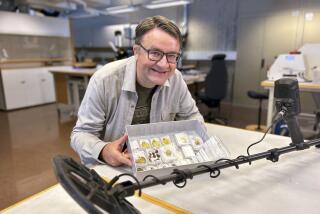French Recognition for Lithuania Is Sweetened With 2.2 Tons of Gold : Baltics: The treasure was stashed in Paris more than 50 years ago. Now it is going home.
- Share via
VILNIUS, Soviet Union — More than 50 years ago, the government of free Lithuania, afraid for its existence, asked France to store 2.2 tons of gold until the day Lithuania was free again.
That day came Thursday.
French Foreign Minister Roland Dumas shook hands with Lithuanian President Vytautas Landsbergis and told him France recognizes Lithuania’s restored statehood and will return the gold.
On a day of notable firsts in the capital of this tiny Baltic republic, Sweden’s newly appointed ambassador, Lars Magnusson, opened the first foreign embassy here, presented his credentials to Landsbergis and held the first diplomatic reception in post-Soviet Lithuania.
More than 30 countries have promised to recognize Lithuanian statehood in the electrifying days since the collapse of the reactionary Kremlin coup last week. Representatives from Denmark and Britain, besides France and Sweden, have sent representatives to Lithuania.
Finland on Thursday became the latest country to establish diplomatic links with Lithuania, as well as with its Baltic sister states, Estonia and Latvia.
Also on Thursday, the Estonian Parliament, which declared the republic’s complete independence last week, voted to take control of Soviet customs posts within its territory.
In Washington, President Bush, who has said he is “very, very close” to acknowledging the independence of the Baltics, appeared likely to extend formal recognition today.
Dumas, in a news conference, said he told Lithuanian officials that the French “have been guarding Lithuanian gold and all of it will be returned to Lithuania and that we will open relations with Lithuania in all spheres, cultural and economic.”
He added that France will deliver a Lithuanian letter to United Nations Secretary General Javier Perez de Cuellar in which the republic will apply for full U.N. membership, Reuters news agency reported.
“Lithuania can be assured that it will receive the support and assistance of France,” Dumas said.
Gediminas Vagnorius, the Lithuanian prime minister, said the diplomatic events of the last week caught his government by surprise.
“Several days ago, no one in the world could have predicted that the French foreign minister would be visiting Lithuania and saying that France is recognizing Lithuania,” Vagnorius said. “Just recently, we had to shake hands with Soviet generals. We are still meeting with them, but their hands are getting warmer. . . .
“We are certain that many countries will continue to recognize Lithuania and that the Soviet Union, too, will recognize Lithuania,” Vagnorius added.
Lithuania, invaded by the Soviet Union in 1940 and annexed under terms of a secret pact with Nazi Germany, has struggled furiously for liberation from Kremlin rule for more than two years.
The republic’s voters repudiated 50 years of Soviet domination and elected a pro-independent Parliament last year. Moscow answered the new government’s March, 1990, declaration of independence with a crippling economic blockade that only strengthened the Lithuanians’ resolve.
Challenged by the Kremlin to prove their commitment to statehood, electors returned to the polls in December and voted overwhelmingly for independence.
But since last week’s failed putsch, the Kremlin appears to have finally given in. Lithuania assumed control of its borders and customs checkpoints Thursday, under an agreement with the Soviet KGB security agency.
Although the dizzying changes in the Soviet Union over the last week have been persuasive enough to make many foreign governments acknowledge Lithuania’s independence for the first time, many Lithuanians said they will not feel completely free as long as Soviet troops remain in the republic.
“Of course, it gives us moral support that other countries recognize us, but it is too early to feel free because the army is still here,” said Andreas Vidras, 27, a construction foreman. “I think we are still a part of the Soviet Union. It is too early to say we are a country.”
More to Read
Sign up for Essential California
The most important California stories and recommendations in your inbox every morning.
You may occasionally receive promotional content from the Los Angeles Times.












